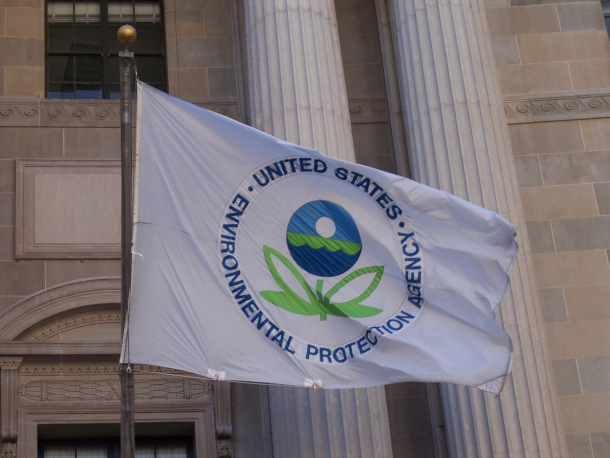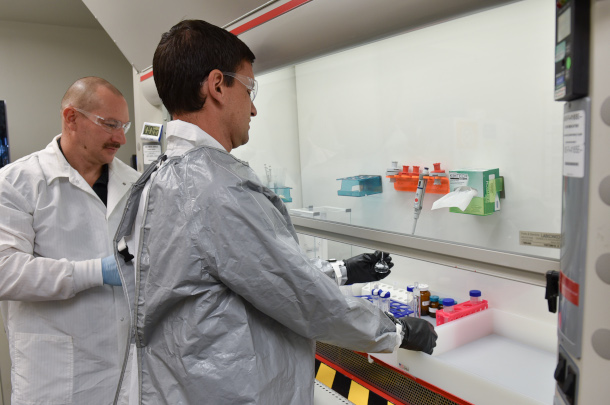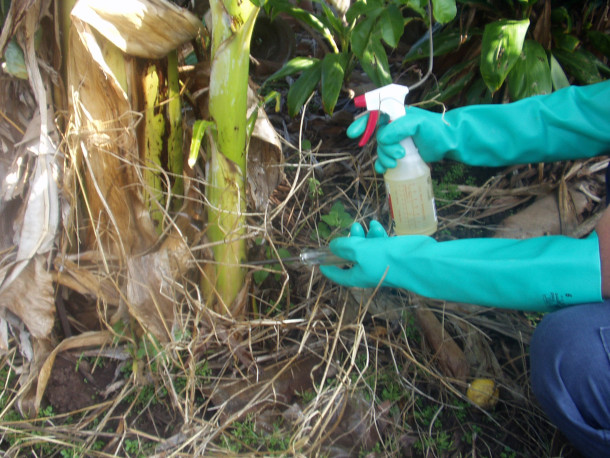Good interview by Steve Curwood of Kyla Bennett, Public Employees for Professional Responsibility (PEER) lawyer for five EPA New Chemicals Division whistleblowers.
From NPR:
Whistleblowers Say EPA Endangers Public Health

The EPA, according to Bennett, has done virtually nothing to regulate PFAS (forever chemicals) and since 2017 has not rejected any of the applications for the hundreds of new, potentially harmful chemicals being produced every year. She and other members at PEER joke that the EPA should stand for “Everything’s Polluted Anyways.” (Photo: Paul A. Fagan, Flickr, CC BY-NC-ND 2.0)
CURWOOD: From PRX and the Jennifer and Ted Stanley Studios at the University of Massachusetts Boston, this is Living on Earth. I’m Steve Curwood.
Five whistleblowers say the New Chemicals division of the Environmental Protection Agency bends over backwards for industry and has even deleted cancer risk findings for chemicals it has approved for public use. They claim this culture of deference to industry has allowed thousands of new and possibly dangerous chemicals on to the market and assert since 2017 the EPA has not rejected a single new chemical application. Whistleblowers say a revolving door between industry and the EPA creates a toxic work environment for career scientists who fear they may be forced to approve unsafe chemicals. For more, I’m joined now by Kyla Bennett, who represents the EPA whistleblowers. She’s a lawyer at Public Employees for Environmental Responsibility, Welcome to Living on Earth!
BENNETT: Thank you so much for having me.
CURWOOD: What's going on right now, in terms of being a little too cozy with industry in the EPA's new chemicals division?
BENNETT: The scientists who are responsible for figuring out whether new chemicals pose risk to human health or the environment, they are being instructed to delete hazards from these risk assessments to make chemicals appear safer than they are, you know, where it says this is a carcinogen. It's crossed out, redlined out. Some of our clients have said, I refuse to have my name on that so-called science. And so management says, "okay, we'll have somebody else post it." In my mind, it's malfeasance.
CURWOOD: So how much danger health-wise does the American public face?
BENNETT: An incredible amount of danger. I mean, if you look at EPA's own data since 2016, they have prevented zero chemicals from going on the market. In other words, everything that comes before them, either gets approved, or not very often, withdrawn by the submitter. All of these chemicals going out, and we're talking about hundreds a year, are not being assessed properly. There's something like 80,000 chemicals out there are currently in commerce. The vast majority of those have never had risk assessments done. Because the statute TSCA that requires this risk assessment to be done came into being in 1976 that automatically grandfathered in all the chemicals that were already on the market. 10 chemicals a year they reassess these old chemicals to see if they're dangerous or not.
CURWOOD: That will take I guess, what 100 years,150 years to go through?
BENNETT: 7000 years.
CURWOOD: Oh, sorry. 7000 years it will take.
BENNETT: So the majority of chemicals that are out on the shelves of Target and Walmart and Home Depot and Lowe's, we have no idea what most of those do to us.
CURWOOD: How long have these transgressions been going on within the EPA?
BENNETT: A lot of people want to blame it on the Trump administration, and indeed it did get worse under the Trump administration. He brought in industry people to run the agency. Under the Biden administration, it's still occurring. We have audio recordings of some of these managers. They said, we just want a button we can press to override all the science. They have a category of cases called hair on fire cases. So anytime an industry or a congressional calls EPA and says, Why is it taking so long, it becomes a hair on fire case, and management takes it and gets it out faster. This is not the way this is supposed to work.
CURWOOD: How much pushback and work pressure are the whistleblowers at the EPA currently under? I mean, how much do they stand to lose?
BENNETT: One thing people don't understand is that these clients of ours become whistleblowers as a last ditch effort. So our five clients at EPA, they did try to use the administrative processes, for example, the scientific integrity policy, they tried going to their managers, they tried filing complaints, internally, nothing happened. So they felt like they were caught between a rock and a hard place. And they stand to lose their careers, their credibility, they’re pariahs to a certain extent. They're all facing incredible retaliation. And sometimes I jokingly say to my boss, I feel like I'm 1/3 scientist, 1/3 lawyer and 1/3 therapist. And they've come forward not for personal gain. But because they are so concerned about what these chemicals are doing to people's health and the environment.
CURWOOD: The journalism organization, The Intercept has been writing a series of articles about the whistleblowers, and one characteristic of their reporting is what looks like a revolving door between industry and the people who decide whether or not it is safe for the public to be exposed to chemicals. To what extent do you see a revolving door?

Chemists at the EPA have been forced to erase findings on the toxicity of certain chemicals. This is a stock photo of a laboratory, not an EPA lab. (Photo: PEO ACWA, Flickr, CC BY 2.0)
BENNETT: I first have to say that The Intercept has done an amazing job. We didn't know who we could bring the story to, because it's very, very difficult and dense science. And I think Sharon Lerner has done an amazing job. And what you say is correct. There's one fellow who has been back and forth between EPA and industry, I think four times now. Of the past nine directors of the Office of Pesticides, seven of them currently work in industry, and the other two just retired. It's kind of a unspoken thing where you work for EPA, and then you'll get a job at industry so you can show them how to get through all those loopholes and get what you want. It's despicable.
CURWOOD: Now, the articles in The Intercept mentioned that the whistleblower report has been leaked to the staff members named in such a whistleblower report. How much does that compromise investigation? How unusual is that?
BENNETT: What happened is in order for the whistleblowers to get protection under the Whistleblower Protection Act, somebody in their management chain has to know that they are the whistleblowers. Because otherwise they could get retaliated against. And the managers could say, oh, I had no idea it was you who was the whistleblower. So in this instance, we sent the disclosure to Dr. Michal Freedhoff, who's the Assistant Administrator, the political appointee for the Office of Chemical Safety and Pollution Prevention. And within three minutes, she sent it to one of the people named in it, and that person then said, please send it to everybody who's named in this complaint, and they actually held a meeting, presumably to figure out how they were going to protect themselves. Does that compromise the IG's investigation? Yes, I think so. It was very disturbing and very unusual to have this happen.
CURWOOD: Now, to what extent are the transgressions you're talking about at the EPA attributable to burnout, understaffing versus just pure negligence or maybe even some more pernicious motives?
BENNETT: It is absolutely true that EPA is under resourced. Dr. Freedhoff has been begging Congress for more money. She claims that this particular division needs at least twice as much money. I agree with her. They're not getting it, by the way from Congress. So that's definitely part of it. But it goes deeper than that. You know, most people when they think about doing risk assessments on chemicals, they probably visualize these people in these white lab coats and labs with, you know, test tubes and Erlenmeyer flasks. That's not what happens. They get the name of the chemical, and they get sometimes just an abstract of an industry sponsored study. And from that they have 90 days to figure out whether this chemical presents a risk or not. Now under the statute, TSCA, they are allowed to ask the submitters for more information, but EPA doesn't let them do that. So yes, resources and funding is definitely a part of it. But honestly, they are allowed to say no, and they are not saying no. And that's the bigger problem.
CURWOOD: Wait a second, the studies on these chemicals—those are studies conducted by the industry itself?
BENNETT: Absolutely. And that's a problem right there. Because as we all know, industry studies can be biased. They are providing their own scientists' studies saying we think this is safe, you've got 90 days EPA to tell us whether you agree or not. I mean, it's really scary. And what they often have to do is rely on an analog—it's a structurally similar chemical. And then they can say, well, this other very similar chemical causes cancer or is a mutagen. And therefore, we think that this new chemical might act the same way. But one of the more frightening things for me is part of tsca section 8(e) requires submitters of chemicals, if they come across information that leads them to believe that their chemical could be a substantial risk to human health or the environment. They have 30 days to send EPA that information. And EPA is supposed to post them on this public facing website called Chem view. And they haven't posted any since 2017. They've been coming in getting stacked up, and they claim they didn't have the resources to post them. In other countries, chemicals are guilty until proven innocent, and in the United States of America gosh, darn it, they're innocent until proven guilty. And they make it as hard as possible to prove them guilty.
CURWOOD: What's the workplace climate like at the EPA, in this division, where the folks are reviewing new chemicals?
BENNETT: I have never seen a division so demoralized, intimidated, unhappy and scared. One of the things EPA did do when we started bringing these issues to the public is they did a survey and the people in the division were saying that the division is toxic, that industry is running it. They're all afraid that they are gonna be responsible for the next PFAS that's killing people. They're all miserable. It's absolutely heartbreaking.
CURWOOD: How are managers or workers' performances measured within the EPA? I mean, what are the metrics and standards that they are held to?
BENNETT: EPA's bean counting seems to be based on how many chemicals do you get out on the market within that 90 day statutory timeframe? What I think it should be is how many chemicals that are dangerous did you prevent from getting out on market? I mean, we joke around that EPA should stand for everything's polluted anyway, instead of the Environmental Protection Agency.
CURWOOD: By the way, how does the EPA’s handling of these chemicals compare to some other international agencies?

Glyphosates and neonicotinoids are known carcinogens, yet are still approved for use by the EPA. (Photo: Scot Nelson, Flickr, Public Domain)
BENNETT: EPA, I think is one of the worst. Look at PFS as an example per-and polyfluoroalkyl substances. We have a national contamination crisis. Every one we look at as toxic, they call them forever chemicals because they don't go away. Even here in my little town in Massachusetts, I cannot drink my water because of how much PFAS we have. What has EPA done? Nothing. They have not banned any of them. They have a guideline on two of them. Europe is moving ahead with banning them as a class.
CURWOOD: What's your wild guess as to how many adverse health effects are in our population from the EPA's failure to appropriately regulate these chemicals?
BENNETT: Virtually every environmentally induced health effect that everybody has is from something that came across EPA's desk, everything, everything. Except for maybe skin cancer, they say something like 15% of cancers are from viruses, but the other 85%, they're from chemicals.
CURWOOD: So what kind of short term measures can people take? How can we know to protect ourselves?
BENNETT: The only thing that I tell people is to try to go as natural as possible. When my husband and I walk our dogs around the block, I can smell people's fabric softeners come out of the dryer vents. Those are carcinogens. These safety data sheets, which are supposed to inform workers or consumers don't have the information on them because of what EPA is doing. So basically, the short answer to your question is it's impossible to know.
CURWOOD: So how can communities act to pressure the Environmental Protection Agency?There’s a special class of communities are at risk. Those folks who live on the fence line of manufacturing facilities or low income minority communities that are already disproportionately exposed to toxins and emissions and don't have the health care options that many people do have? What can be done?
BENNETT: You know, we're here to help. There are other environmental groups that are trying really hard to help. Environmental Working Group and Earth Justice. But if you look at, for example, Cape Fear in North Carolina, those community groups are fighting back really, really hard against the PFAS contamination in their towns. Flint, Michigan, they've got some great activists there, their water is still not safe to drink. And not only do they have lead, but they have PFAS as well. The only advice I can give them is to do Freedom of Information Act requests to EPA, push them, call your Congressionals, both state and federal. So many people think that because a Democrat is in office as President, that the EPA is okay. It is absolutely not the case.
CURWOOD: So what about the investigation into the EPA, what kind of changes are possible?
BENNETT: I have a lot of hope with the Inspector General. They are taking this very seriously. They have a team of people, they got confidential business information, CBI, cleared. They brought on board chemists and toxicologists to review the information that we've given them, but it's slow going, and we gave them so much information. I'm hoping that the investigations are finished sometime this calendar year. But the tricky part is that once the inspector general comes out with a report or reports, they don't have enforcement power, its recommendations to EPA. So what do we think EPA is gonna say? While we may be vindicated, is the problem going to get fixed? I honestly don't know.
CURWOOD: Kyler Bennett is Director of Science Policy for Public Employees For Environmental Responsibility. Thank you so much for taking the time with us today.
BENNETT: Thank you so much for having me. I really enjoyed it.
Related links:
- Kyla Bennett’s website at PEER
- The Intercept’s series on the EPA Whistleblowers
No comments:
Post a Comment